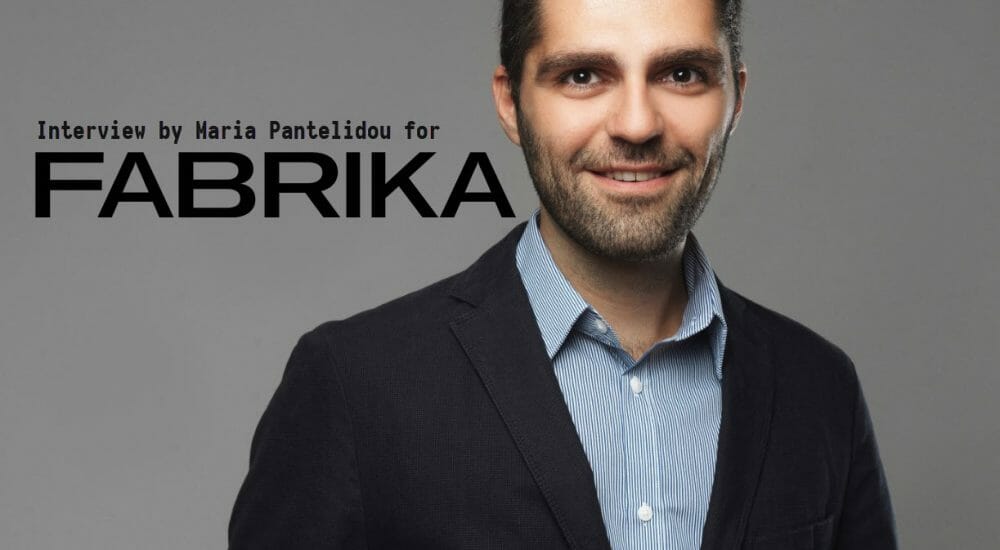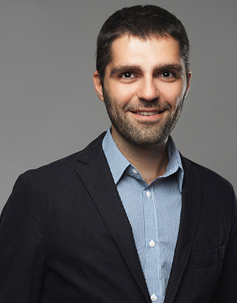Digital Analytics: Dating … data for MariasNext @Fabrikaid.gr
Recently I was interviewed by Maria Pantelidou, who is hosting an interesting series of interviews from talented professionals in Thessaloniki, Greece. I was really honored to be among the rest of the great people who already appear in her previous interviews. She gave me the chance to take some time and think about all the decisions and lucky turns in my life that helped me end up where I am. We discussed about the company (baresquare) I am working for the past 11 years, my career in digital analytics and the community for digital analysts I started in my town 2 years ago (Digital Analytics Meetup, Thessaloniki). Below is a copy of my interview translated in English. Head to Fabrika’s website for the original version (in Greek) and for more inspiring life stories from Maria.
Interview in English
In the daunting and chaotic landscape of the new digital economy, where everything and everyone is translated into huge volumes of data, some find … Ariadne’s mist. They decode the data and translate them into useful and usable information to our advantage. To find them, you do not have to reach … MIT in the US. Start from a Meetup here in our own Thessaloniki. One of those … geeky meetings where guys like Panagiotis Tzamtzis, who is also the community’s main coordinator, gather, talk and find ways to map innovative paths to the exciting new world of Digital Analytics. Panagiotis Tzamtzis told us about his subject. The power of technology. The complexity of information. And the reasons why, you should never take yourself for granted when working in information technology and computers.
1. I am going to the landing page of the company you are working on. Baresquare. I read: Action-Driven Analytics, AI Driven Automation … Well, I confess it, it’s all … geek to me! Why is it so difficult for us common mortals to understand many of the terms of the digital economy? And what can we do about it?
The truth is that looking at the Baresquare website, you pounded straight into the deep. The terms that caught you off are techniques we use in data analysis. It is a science that has experienced such a rapid bloom that is difficult to follow, without starting from some basic techniques. The gap between traditional data analysis techniques and digital data analysis is enormous. You see, in the past years what everyone was looking for was more data to analyze. Using technology this has changed and there is an incredibly large amount of data available. This change has created a difficult puzzle, how can we analyze much more data with the same number of people. This is what eventually led us to smart digital analysis techniques. Now that this puzzle has been solved to a great extent, we are looking for ways which will allow us to take faster decisions and react, based on the results of smart analysis. This you can say is the story of the birth of digital data analysis in 5 rows. If you want to learn more, you are welcome to come to the meetings we hold with the Digital Analytics meetup and hear how each analyst has experienced this revolution.
2. Do you want to translate what you do in Greek? What is it, how is it achieved and why does your services become ubeatable in the modern international business landscape?
Now you are putting me into a tight spot, because usually when I talk about our work half of the words I use are in English. We are a group of people who are trying to answer questions using technology. We undertake the task of collecting the digital pieces of data that are available, analyzing them and presenting them in a way that allows us to make timely and correct decisions, but also to automate similar future decisions. Our love for our job and our passion for the continuous improvement and development of our work is what has helped us to succeed. Our presence in the international business landscape is essential to satisfy our need for new trivial challenges.
3. How did you decide to follow this path? Did you say when you were little, when I grow up I want to become a “digital analytics consultant”?
From a young age I was sure for just one thing, that I wanted to deal with technology. From the primary school, when I came into contact with my first computer, I gained a love and curiosity about the technology that never left. This was what led me to study computer science. My love for digital analytics came a little later when I met a pioneer in this field, Georgios Grigoriadis, the founder of Baresquare. When I started to deal with digital analytics about 11 years ago, it was a one-way journey. Everyday I have the opportunity to deal with such different challenges, but also witness developments that change the way everything around us works, from a front row seat.
4. This year’s Digital Analytics Meetups, which you coordinate, took place several times. Let’s take stock. What did attendees learn? Who is this meeting for and why is it important?
The Digital Analytics meetup was an idea I had about 2 years ago, after witnessing similar communities abroad. I was looking for a way to get to know more people in the city who have similar research and professional concerns, to exchange ideas and to help everyone who wants to get to know the industry better. After 20 meetings and more than 1,300 members, the community that has been created has the ability to bring together its members with companies, to provide a data analyst with a space for discussion of problems concerning him/her, and to create collaborations that can lead in research and professional success. Participation is free for anyone who wants to learn more about data analysis and how it applies in everyday life.
5. The IERAX ANALYTIX hawk would like to know how a marketing or business strategy writer describes the so-called trends in a global marketplace? Do you think that young consumers are building brand names or is it something else that creates behavioral tendencies by referring to robotics, machine learning, artificial intelligence and anything else that is not coming from the future but is already here?
The IERAX ANALYTIX hawk I’m sure knows how difficult it is to understand market trends, especially when you try to answer this question globally. The problem becomes even more complex and this complexity can be reduced using technology. Although we are now discussing exotic digital techniques that find answers to complex problems, many SMBs but also larger businesses are still having trouble digging into the digital age. Without this difficult transition, they can not take advantage of all the exciting developments we have discussed. Regarding consumer behavior and how it is influenced by companies, you can only describe it as a continuous exchange of ideas. Companies are shaped by consumer needs and consumer priorities are changing from the stimuli they receive from companies. The most important change brought by boom of digital analytics and artificial intelligence is that they can make this interaction more personal and tailored to the needs of each individual. This tendency to personalize services and corporate messages, you can say it shows that the consumer’s opinion ultimately prevails.
6. Only thinking about algorithms gets me headache … Do you become a good programmer or are you born? What does it take to master IT?
I would say both… Before you become a developer you have to be sure you have the “microbe” inside you. You need to have the constant need for evolution and the thirst to be aware of new technologies. You can say that every few years you have to become a programmer again! If this need is not rooted in you, it is an profession that you can hardly keep track of as you go through the years.
Original Words Credits: Maria Pantelidou, Creative Copywriter
Content Placement: Powered by IERAX ANALYTIX


